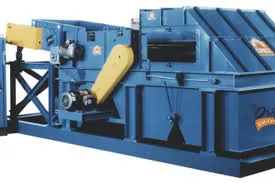

oct. . 20, 2024 13:19 Back to list
Efficient Waste Management with MSW Sorting Plants
Municipal Solid Waste (MSW) encompasses various types of refuse generated by households, commercial establishments, and institutions within a municipality. As urbanization continues to escalate and populations grow, effective waste management becomes increasingly crucial. One of the most promising solutions to tackle this challenge is the implementation of MSW sorting plants. These facilities play a pivotal role in enhancing recycling rates, minimizing landfill usage, and promoting sustainable waste management practices.
The Importance of MSW Sorting
MSW sorting is the process of categorizing different types of waste to facilitate recycling, composting, or proper disposal. The primary objective of sorting is to separate recyclable materials such as paper, plastic, metal, and glass from the general waste stream. By doing so, sorting plants can significantly increase the efficiency of recycling processes, thereby conserving natural resources, saving energy, and reducing greenhouse gas emissions.
The increase in waste generation per capita has necessitated more sophisticated waste management strategies. Sorting plants serve as a critical intermediary in the waste management hierarchy, transforming mixed waste streams into useful materials. They not only help in diverting waste from landfills but also enhance the overall sustainability of municipal waste management systems.
How MSW Sorting Plants Operate
MSW sorting plants utilize a combination of manual and automated processes to efficiently sort waste. Upon arrival at the facility, mixed waste is typically unloaded onto a conveyor belt. Here, workers or machines can assess and remove larger items and contaminants before the waste undergoes further processing.
Automated technologies play a significant role in modern sorting facilities. Systems such as optical sorters, air classifiers, and magnetic separators are employed to efficiently identify and separate materials according to their composition. Optical sorters use advanced imaging technology to recognize different types of plastics and papers, while air classifiers can separate lightweight materials from heavier ones. Magnetic separators help in extracting ferrous metals, which are easily recyclable.
The sorted materials are then baled or compacted and made ready for shipment to recycling facilities or markets. The efficiency of these plants not only enhances the quantity of materials that can be recycled but also reduces the contamination levels that often occur when recycling items are not properly sorted.

Economic and Environmental Benefits
The establishment of MSW sorting plants brings a multitude of economic and environmental benefits. Economically, these facilities create jobs within the community, from operational staff to those involved in transportation and recycling processes. Additionally, recycling generates revenue through the sale of sorted materials, which can offset the operational costs of waste management systems.
Environmental benefits are equally significant. Sorting waste reduces the amount of material sent to landfills, thereby conserving space and extending the lifespan of existing landfills. Less waste in landfills means reduced methane emissions—a potent greenhouse gas produced during the decomposition of organic waste. Moreover, increased recycling rates contribute to reduced energy consumption and lower carbon footprints associated with the production of new materials.
Challenges in MSW Sorting
Despite these advantages, MSW sorting plants face several challenges. High initial investment costs, technological maintenance, and the need for skilled labor can pose obstacles. Additionally, contamination of recyclable materials remains a persistent issue, as consumers often do not adequately separate their waste at the source. To combat these challenges, public education and outreach initiatives are essential to raise awareness about the importance of proper waste sorting.
The Future of MSW Sorting
As cities continue to grow and the urgency for sustainable waste management intensifies, MSW sorting plants will play an increasingly vital role. Advances in sorting technology, coupled with public engagement and policy support, will drive the evolution of these facilities toward greater efficiency and effectiveness.
In conclusion, MSW sorting plants are essential components of modern waste management strategies. By efficiently separating and processing solid waste, they significantly contribute to recycling efforts, resource conservation, and environmental sustainability. The continued investment in and development of these facilities will be crucial in addressing the pressing issues of waste management in our urban environments. Through innovation and public cooperation, the future of waste management can pave the way for a much cleaner and greener planet.
Latest news
Troubleshooting Common Eddy Separator Problems
NewsJul.04,2025
The Role of Metal Recycling Plants in Circular Economy
NewsJul.04,2025
The Impact of Recycling Line Pickers on Waste Management Costs
NewsJul.04,2025
Safety Features Every Metal Shredder Should Have
NewsJul.04,2025
How Industrial Shredders Improve Waste Management Systems
NewsJul.04,2025
How Cable Granulators Contribute to Sustainable Recycling
NewsJul.04,2025